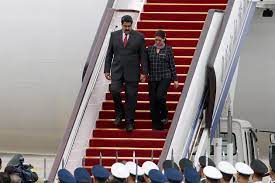
In a significant move that underscores the ongoing tensions between the United States and Venezuela, the U.S. government has seized a plane reportedly used by Venezuelan President Nicolás Maduro. The seizure is part of a broader strategy by the U.S. to increase pressure on the Maduro regime, which Washington accuses of corruption, human rights abuses, and undermining democracy.
See Here:
Background of the Seizure
The U.S. government has long been critical of President Maduro’s administration, accusing it of running an authoritarian regime that has led to the economic collapse and widespread suffering in Venezuela. The seizure of the plane, believed to be linked to Maduro or his close associates, is seen as a direct attempt to curb the regime’s international activities. The plane was reportedly confiscated under U.S. sanctions that target assets believed to be used for illicit activities by the Venezuelan government.
Legal Basis for the Seizure
The U.S. Department of Justice (DOJ) carried out the seizure under the authority of the Office of Foreign Assets Control (OFAC). OFAC enforces economic and trade sanctions against countries and regimes that pose a threat to U.S. national security or foreign policy. The plane in question is alleged to be involved in activities that violate these sanctions, including transporting individuals and goods that are part of the Maduro regime’s illicit networks.
The U.S. government has previously targeted other assets linked to Maduro’s inner circle, including bank accounts, luxury properties, and other vehicles. The seizure of the plane is part of a broader effort to limit the mobility and financial resources of the Venezuelan leadership.
Implications for U.S.-Venezuela Relations
This action is likely to further strain relations between the U.S. and Venezuela. The Maduro government has consistently denounced U.S. sanctions as illegal and an act of economic warfare. In response to the plane’s seizure, it is expected that Caracas will escalate its rhetoric against Washington, potentially leading to further diplomatic confrontations.
The seizure may also impact Venezuela’s international dealings, as the U.S. continues to tighten the noose around Maduro’s regime by isolating it economically and diplomatically. This move could discourage other countries and businesses from engaging with Venezuela for fear of becoming entangled in U.S. sanctions.
Reactions from the International Community
The international community is watching closely to see how this latest development will affect the already volatile situation in Venezuela. Some countries may view the seizure as a legitimate action against a regime accused of widespread human rights violations, while others, particularly allies of Venezuela, may see it as an overreach of U.S. power.
Latin American countries, in particular, are likely to have divided opinions, with some supporting U.S. actions against Maduro and others advocating for dialogue and negotiation instead of punitive measures.
Potential Consequences for the Maduro Regime
The seizure of the plane adds to the mounting pressure on President Maduro and his government. With limited access to international assets and resources, the regime may find it increasingly difficult to maintain its grip on power. The action could also embolden opposition forces within Venezuela, who have long called for stronger international intervention against Maduro.
However, Maduro has shown resilience in the face of previous U.S. sanctions and continues to have the backing of key allies like Russia and China. The seizure of the plane, while significant, may not be enough on its own to shift the balance of power in Venezuela.
Conclusion
The U.S. government’s seizure of a plane used by Venezuelan President Nicolás Maduro marks a bold step in its ongoing efforts to undermine the Maduro regime. While this move is likely to exacerbate tensions between the two countries, it also highlights the lengths to which the U.S. is willing to go to pressure the Venezuelan leadership. As the situation unfolds, the international community will be watching closely to see how this development impacts the broader geopolitical landscape in the region.





